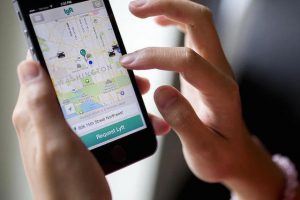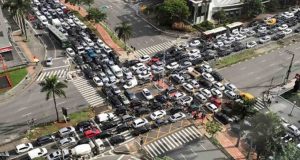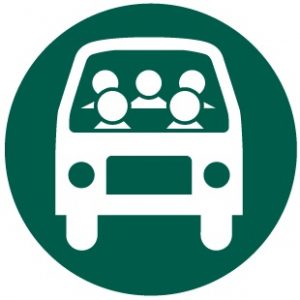In physics, there is a reaction to every action. In politics, there is always an unanticipated consequence to every policy. Sometimes, several. And often, they are worse than the problem which the policy was ostensibly meant to ameliorate.
Ride-sharing has been – is being – pushed as a way to “reduce congestion” in cities and also to salve the planet – or rather, salve the neurosis about the “climate” being in “crisis” – by reducing the quantity of carbon dioxide “emitted” by motor vehicles.
Boomerang. The reverse is happening, according to the latest stats and studies – which show that ride-sharing services like Uber and Lyft are making traffic worse and increasing ”greenhouse gas” emissions by dint of that.
The reason why is as obvious as the name.
People don’t want to share a ride. They want a ride – by themselves. Not necessarily (though legitimately) because most people don’t want to rub elbows with – and inhale the aromas of – random strangers in the close confines of a car but also because it isn’t convenient to share a ride. At least, not if the people you’re sharing a ride with aren’t headed to the same place or at least in the same direction.
It’s the Carpool Problem revisited – and magnified.
In theory, it sounds like a good deal. Instead of four people each driving their separate cars by themselves, burning four times as much gas, why not all ride together in one car and save all that gas? And as a side-benefit to others on the road, there are three fewer cars on the road.
Except now you have to wait on those three other people to get organized and ready to go, both coming and coming. Someone will always be “ running late” – and so you wait. If you have somewhere you need to be, that is a problem as well as an annoyance.
Instead of just getting in the car and going – by yourself, on your own schedule you are bound to other people’s schedules. It invariably takes more time to get where you’re headed – and time has its costs, too. Being forced to listen to the music you don’t like does, too. And then the pressure to chit chat when all you want to do is wind down.
Ride-sharing has all of these downsides plus the additional downsides of the others in the car not going to the same place. Which means stop to pick them up or drop them off and and detours before you get to your place.
Which means you share a longer ride.
No wonder not many people want to. And thus, they don’t. They Uber or Lyft by themselves, which means one Uber or Lyft car for each solo rider rather than the projected one car for several riders and an increase in traffic rather than the “elimination” of it as promised five years ago by Travis Kalanick, then-CEO of Uber.
“If every car in San Francisco was Ubered there would be no traffic,” he said.
What’s been delivered is another thing.
San Francisco’s traffic is worse. Ditto Chicago’s and New York’s. And not just because of solo-riding. When people drive their own car to work or downtown, they stop driving it once they get downtown. A parked car doesn’t increase congestion – or “emissions.”
But Uber and Lyft drivers never stop driving. They cruise around all day looking for riders. According to a Dow Jones/Wall Street Journal study, 40 percent of the time, Uber and Lyft drivers are driving themselves around.
This not only increases traffic and “emissions” – it also increases attrition, the rate at which cars are thrown away and replaced with new cars.
Ride-shared cars wear out faster, just like taxis and cop cars, because they’re in use longer. The miles rack up, the life goes down. Instead of taking ten years to accrue 150,000 miles and become a candidate for the salvage yard, an Uber or Lyft’d car can rack up 50,000 miles in a year – and transition into scrap metal candidatehood in half the time, necessitating a new car be manufactured to replace it, with all the attendant “consumption” of natural resources and “emissions” associated with manufacturing.
Even the Union of Concerned scientists is . . . “concerned.”
Another hilarious thing – if you like dark humor – is that solo-Ubering has also resulted in fewer people using government (styled “public”) transportation to get to and from. For the same reasons people eschew the carpool. Busses and trains make you wait on their schedule. You also have to share the ride with sometimes smelly, loud and otherwise unpleasant people.
Hail an Uber or Lyft and you avoid all that.
But – boomerang – it results in more of precisely the things ride-sharing was supposed to deliver less of.
One study – done by the University of Kentucky and published in the academic journal Science Advances found that “over 60 percent of the slowdown of (average) traffic speeds in San Francisco between 2010 and 2016” was attributable to the increase in solo ride-sharing and ride-sharing drivers just driving around.
It’s gotten so bad in Chicago that the city recently imposed a surcharge on every ride-share fee, which will have the also-hilarious effect of encouraging people to drive their own cars to work again, once the cost of paying for a ride becomes too high relative to the greater convenience (and lower overall cost) of just driving yourself.
For most of the people ride-sharing, the whole point of the thing was to reduce their commuting costs and to increase convenience. But when you’re paying more to ride-share than it costs to fill up your tank, most people aren’t going to ride-share.
Even if they’re the only one in the backseat.
…
Got a question about cars, Libertarian politics – or anything else? Click on the “ask Eric” link and send ’em in!
If you like what you’ve found here please consider supporting EPautos.
We depend on you to keep the wheels turning!
Our donate button is here.
If you prefer not to use PayPal, our mailing address is:
EPautos
721 Hummingbird Lane SE
Copper Hill, VA 24079
PS: Get an EPautos magnet or sticker or coaster in return for a $20 or more one-time donation or a $10 or more monthly recurring donation. (Please be sure to tell us you want a magnet or sticker or coaster – and also, provide an address, so we know where to mail the thing!)
My latest eBook is also available for your favorite price – free! Click here. If that fails, email me at [email protected] and I will send you a copy directly!












When I think of “ride sharing”, I think of a group of friends cramming into a single car to go get food or a sportsball match. It works only because everybody knows eachother, and are traveling from the same start to the same finish, at the same time.
Lyft and Uber may or may not be economically viable. It is tough for anything leveraged to be economically viable. Doesn’t matter what it is. I would imagine that they would be if you could drive your older paid for car. For Uber and Lyft to manage, they may end up relaxing the rules. All that said, they are completley an outgrowth of a distorted market for transportation services. Taxis were a protected cartel. Mass transit is an entrenched, money losing bureaucracy using leveraged capital of their own with unionized, though low paid, labor. All of it rests on a paid for infrustructure (the roads) overloaded with spread out leveraged commercial and residential property, sometimes leveraged 10 times over the original cost. This house of cards will continue to go on until a strong wind blows it down. In the meantime, I am sure that many people are enjoying riding in other people’s newer cars where they don’t have to breath coronavirus in a city bus.
Swamprat,
” I am sure that many people are enjoying riding in other people’s newer cars where they don’t have to breath coronavirus in a city bus.”
I guess these people are ok with this,
https://www.autoweek.com/news/industry-news/a31115639/pest-control-companies-warn-rideshare-cars-can-have-bedbugs/
Bed bugs > Coronavirus
The premise of ride “sharing” was that someone who happened to be going to Denver would share the trip with you, splitting gas money or whatever. Of course that wasn’t going to work, not that many people are going to the same place at the same time. And the services happened to hit in 2008, when a bunch of house flippers and mortgage brokers suddenly found themselves out of work and possibly bankrupt. But they all had big new cars, so why not make a few bucks waiting for the next bubble?
Gypsy cabs, Jitney busses, whatever. They’re all just unlicensed driving services. The fact that no major city started rounding up Uber and Lyft drivers implied tacit approval. And now that genie won’t ever go back in the bottle. The NYC taxi medallion market, destroyed. Airport curbside drop-off lanes will never be the same. All that’s left is for Uber and Lyft to buy up all the old taxi companies and convert them to in-house vehicles.
Never believe an excuse for a tax in Illinois, more so for cook county, and another layer in that direction for Chicago. They decide on creating and raising taxes and then figure out a sales pitch. Plus with the relatively recent additional taxes on parking in Chicago and the increased state gas tax they want people to drive their own cars.
I was just thinking this the other day when I got on a London bus after ages. Just realised that since they invented Uber – I never used the bus/underground! Its just so much more convenient, and thanks to the bureaucracy and unions – its actually cheaper too for many journeys, especially if you’re more than one person (which I usually am when in central london)…. Yes I get its subsidised at every level thanks to cheap money printing where new cars are handed out on financing to anyone with a pulse…. but while it lasts I intend to enjoy it!!
Uber and Lyft Generate 70 Percent More Pollution Than Trips They Displace, Study Finds
https://tech.slashdot.org/story/20/02/26/0127232/uber-and-lyft-generate-70-percent-more-pollution-than-trips-they-displace-study-finds
My answer to this objection is “who cares?”
The person driving the lyft or uber car is paying the taxes to drive on the roads and the cars emit 10% of the pollution that they did 50 years ago, so, I don’t see a problem. Prior to Uber and lyft, people got around by cars, taxis, mass transit and other methods. Today, they get around by cars, uber, lift, mass transit and other methods. Nothing’s changed.
yo Eric, why no article yet on impending supply chain collapse of our brave patriotic American Auto Makers and their chinese parts? One benefit of having a Japanese import, a lot of their electronics are made at home in Japan! HIYA!
Hi Brazos,
It’s in the works!
Despite the problems of mechanical wear to ride shared cars and increased traffic congestion, Uber and Lyft have driven the cost of private rides down and the availability up for millions of riders. People who provide the rides have been able to supplement their income. Because of Uber, I don’t have to ask someone for a ride to the car repair shop after work, inconveniencing them. So, I don’t really care about his or its requisite problems. Ride sharing does, however illustrate the dangers of going away from private vehicle ownership. What a nighmare.
Hi Swamp,
I would never be an Uber or Lyft driver; you eat the gas and wear and tear… the share of the fare you get almost certainly isn’t enough to make up for it.
Plus, I hate hate names! Idiotic Millennial-speak. Perpetual adolescent snarkiness from people now well into their 30s.
Hi Eric –
I wouldn’t either, but some folks haven’t figured that out yet, so users of the services are getting their money’s worth for sure.
It would be great to have even more options. The problem is and always has been road infrastructure is way behind. Has been that way since the early 1980s.
I ran the numbers a couple of times when I was unemployed. It never penciled out, ever, not even close. You don’t make money if you consider all your expenses and your time. Frankly I have no idea how they get anybody to drive for them. I guess most people don’t do the numbers beforehand.
It doesn’t help they don’t let you use an old cab or something. You can’t reduce the costs of a newish car much.
It’s a way of monetizing your car without selling it. You pay for the privilege with your time.
Morning, Rich!
Yup; it’d be a doable thing if one could use an old/paid-for “hooptie” – but I think their rules require the driver use a fairly new car. For saaaaaaaaaaaaaaafety.
Just wait until more people start figuring out that their personal private car insurance doesn’t cover them when they are using their cars commercially! (As more people are starting to see)- and then have yet another expense of having to get expensive insurance!
Funny, I was just hearing last night of a lady who leased a new car so she could be an Uber driver…and then found out that Ubering didn’t even pay enough to cover the cost of paying the lease!
Ya know, in the past, usually people collectively had enough sense so that whatever came down the pike was at least sustainable, and thus once a new idea was implemented, it would usually be around for many decades, and only be superseded when something new and better came along- usually due to a new technology being developed. By contrast, today, they just come up with all of these wild hair-brained Lucille-Ricardo-esque schemes, which are never very well thought-out; they rush to implement them on a whim; they never make any money (But somehow, the companies which champion them manage to slog on for years…) and they just collapse before long, after it becomes glaringly apparent even to the most starry-eyed fool that the idea was never very well thought-out and can not be sustained.
A few years from now, the survivors are going to look back on this time, and wonder what society was collectively smoking. EVs? Self-driving cars? Uber? Smartphones? Simple things like fruit, veggies and $2 trinkets coming from halfway across the world? They’ll wonder: “How could these people not see that all of this was just going to fall apart, because it is the gross over-complication of the simplest things, and the collectivizing of what could be done so much better individually?”.
Our day is beginning to make the Middle Ages look sane.
Hiya Nunz! Hey at least in the Middle Ages they only took about ten percent of the serf’s income, unlike today’s tag team of city/state/feds that vacuum up about half of whatever you’ve got.
Back in the day when I was a college student we’d “ride share” the old fashioned way – anyone that had a car up here and was driving home for the holidays, semester break, whatever would ask around and get a few others to share costs. Passengers would pay for the driver’s gas and tolls and get dropped off at a rest stop on the Garden State Parkway where a family member or friend would pick you up. Reverse the process for the return trip; did that for a couple years till I got my own car.
Regarding the insurance mafia I get a notice every year when my policy is renewed reminding me that I’m NOT covered if I use my car for Uber or Lyft, that of course requires an additional mulcting.
Hi Swamp,
“Uber and Lyft have driven the cost of private rides down and the availability up for millions of riders”.
Had cab service not “evolved” into a State created monopoly cartel, Uber and Lyft would not be unique. Who knows what innovations would have occurred naturally due to consumer demand and competition. Jitney service, private bus lines, high end car services, etc… would meet the varied needs of different groups. Government intervention always diverts resources along political, not economic, lines. The tragedy is, as Bastiat noted, we never see what could have been.
In 2011, a young entrepreneur in Detroit founded the Detroit Bus Company. He bought a bunch of mid sized used school buses, refurbished them, hired local artists to paint them and equipped all of them with free wifi. He tried to get licensed by the city, but that proved impossible. So, he just started running them anyway. The buses do not have set routes, they travel according to need. Average wait time is a few minutes after “hailing” a bus with a smart phone. Of course, when city government was incapable of providing any of the “services” that supposedly justify its’ existence, the current mayor decided that the top priority of the city was to go after “illegal” businesses (the only thing actually making Detroit a better place).
Of course, they went after the DBC. But, he fought back in a brilliant and innovative way. You see, the city couldn’t even get kids to school (I think about half of the kids enrolled in public schools were not getting bus service). So, the owner of the DBC started taking all of these kids to school, for free. When the city tried to shut him down, the parents cried foul and the city backed off. The point is, the market will provide all kinds of solutions to “public” transportation, if just left alone. These solutions cannot be planned, doing so merely protects bad solutions and prevents innovation.
Bastiat again, “Plans differ, planners are all alike”.
Cheers,
Jeremy
Government in many cities has been aggressive in attacking private transit-like services. There are also others who champion transit until someone does it privately and voluntarily. It becomes clear what is desired is power and the ability to engineer society.
I uber in blue cities like Chicago and NYC because it’s more convenient and cheaper than being fisted by taxes and parking with a rental car. My last car in Chicago, the taxes were more than the rental.
I use it t/f the airport here because it’s more convenient and nicer than a cab or stupidshuttle.
Last trip I went to Seattle, and we ubered a ton because we were drinking.
It’s better run, cheaper, and easier to use than cabs. You’d think that the dumbass cab companies would use Uber’s IT infrastructure – “Uber Ghetto” to keep business.
BTW- I”d use “Uber Ghetto” if they had it.
I think it’s a crying shame rent-a-wreck went under. I used to use them when I could back in the day.
Certainly no worse than the crap shoot I’ve had with other rental companies.
There was a big a big battle when Uber tried to live into NH. The cabbies were getting killed by the competition, so tried to come up with their own system, based on text messages. It was clunky and just terrible. Entrenched interests rarely innovate.
re Chicago increasing ride share fees has nothing to do with congestion and everything with the communists here stealing every penny they can. There is nothing enjoyable about driving a car here. Salt – potholes – jack off bicyclists – parking – fines – fees – it never ends.
I’m REAL popular with my friends, family and coworkers because I like to drive to work without saying a word, listening to the same song over and over again the whole way.
And back home again.
Needless to say, I fly solo.
I have no need to speak but do like listening to Willie’s Roadhouse which makes millenials eyes glaze over. When my dear old mother was alive she wanted to talk over Leon Redbone, Guy Clark, Emmy Lou, etc. She’d have been ok with the like of Barbara Streisand and other soul-less artists of the mid 20th century. Seriously, anyone want to hear Kenny Rogers or Rogers and Hammerstein?
Lyft is a decent service. I have used it multiple times at a much less expensive rate then what taxis’ cost. It’s nice to use a CC to pay instead of cash, plus taxis tend to be grizzled immigrants who can barely speak English, instead when I do ride sharing for a fee, it seems more like simply catching a ride from friends I haven’t seen in awhile. You can order the size vehicle you need before it comes to pick you up.
One reason the drivers are nicer is because they get instant feedback from their fares in the form of logged tips. Taxi drivers probably don’t get tips, at least I’ve never really felt the need to tip beyond rounding up to the nearest $5. But the app uses an instant percentage calculation based on service.
I have never lyfted or ubered or rode share with any one. I took the bus once, once was enough. Now there is an article bemoaning that pesticide companies frequently rid bed bugs out of those same riding sharing cars… I thought ride sharing cars are like Taxies, they provide the same function. Taxies are under regulations in most cities. I would rather burn my on gas, and find a parking space at my schedule. Besides, I don’t go into cities anymore, Like Remmus says, “Stay away from crowds.”